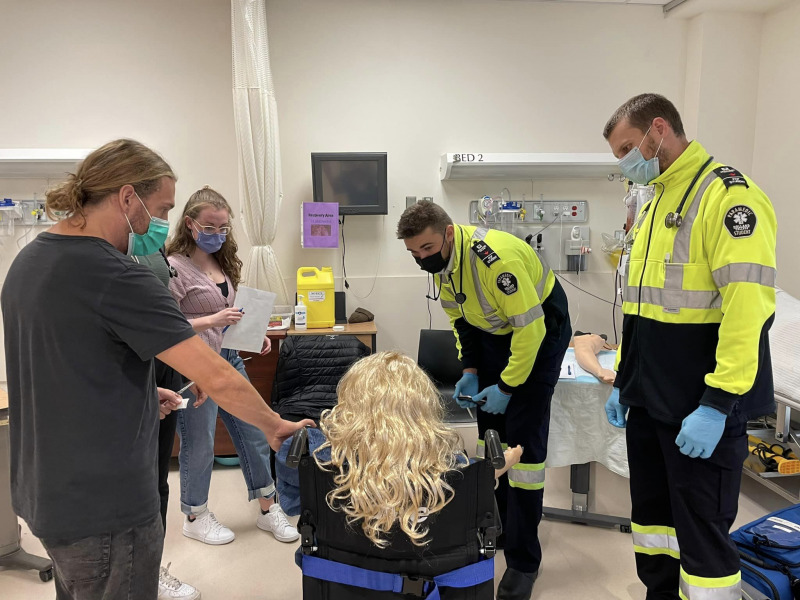UPEI and Holland College host joint interprofessional simulation lab

The first-ever interprofessional simulation lab, involving UPEI nursing students and Holland College paramedicine students, took place on September 23, 2022, at the UPEI Faculty of Nursing in the Health Sciences Building.
Fourth-year Nursing 4010 Population Health students and second-year Holland College Advanced Care Paramedicine students, as well as faculty and staff, came together for the day to engage in interprofessional simulated learning with the overall goal of increasing understanding and awareness about the scope, roles, and responsibilities of each profession.
“Nurses and paramedics interact regularly in the health system. We wanted to teach the students the importance of taking a holistic approach to patient and client care, especially in critical situations,” said Dr. Christina Murray, interim dean of nursing. “We know that when there is strong collaboration, patient safety and outcomes are improved. Integrating interprofessional learning opportunities that showcase the scope, roles, and responsibilities of nurses and paramedics while they are students will help them have a better appreciation for each other as they transition into professional practice where they will work together, not only in emergency situations but also in community, home care, and palliative care settings as well.”
The interprofessional simulation labs were designed as flu clinics. Each student worked in various roles required in an immunization clinic such as intake, vaccine administration, or post-vaccination recovery. The “patient” in their care experienced an adverse reaction to the vaccine, which led to an emergency situation. When the situation turned from stable to an emergency, the paramedicine students were called in. The patient had to be cared for in the most safe and effective manner. As the simulation advanced in complexity, nursing and paramedicine students had to recognize their scope of practice, perform detailed assessments, and develop appropriate treatment plans. Through the simulation lab, students integrated their knowledge into practice and left the lab with a better understanding of role-clarification, team functioning, collaborative leadership, interprofessional communication, and conflict resolution.
The day was organized by the UPEI Faculty of Nursing and involved many instructors who coordinated logistics for weeks leading up to the event. Tammie Muise, simulation coordinator said the day involved over 100 students and instructors, including 73 nursing students from UPEI and 27 paramedicine students from Holland College. Muise, Dr. Janet Loo, Course Coordinator of NURS 4010 and their team worked closely with Holland College paramedicine instructor Matthew Stride to coordinate details. There were three simulation time slots throughout the day with four “clinics” running simultaneously during each slot as well as a debriefing session afterward for every group.
“As the saying goes, ‘it takes a village,’ and there were many people on both sides helping to make it happen,” said Muise. “Having two institutions rearrange classes and schedules to make it all work and finally come together is just phenomenal!”
Maureen MacInnis-Wheatley, learning resource centre coordinator in the Faculty of Nursing at UPEI, was also closely involved in the planning of the interprofessional simulation lab. She said the day was so important to include in the curriculum because the scopes of both nursing and paramedicine sometimes overlap and more opportunities for collaboration in their educational programs helps to improve communication and collaboration in practice when they graduate, resulting in better patient care and improved patient outcomes.
“Good communication and clarity of roles can be critical at different cross points.,” said MacInnis-Wheatley. “Interprofessional collaboration optimizes performance of all professions and it’s key that this collaboration begins as part of their educational preparation.”
Nursing student Holly McKenna said the simulation was a valuable experience overall, and she was grateful for the opportunity to learn how the two professions work best together.
“It was a really cool experience to see what the paramedicine students do and to see what paramedics do in general. Understanding their role, exactly what they do, and how they do it was probably the most interesting part of the whole experience for me,” said McKenna.
Paramedicine student Renee Arsenault said she was “super happy” to have the chance to experience the interprofessional simulation with the nursing students.
“I think it’s something we should do more of so we can better understand each other’s scope of practice. I was really surprised how well everyone merged and started working together. We just focused on the patient and what we had to do. I think it’s really cool to see how each profession works, especially because we’re going to be working together so much in the real world,” said Arsenault.